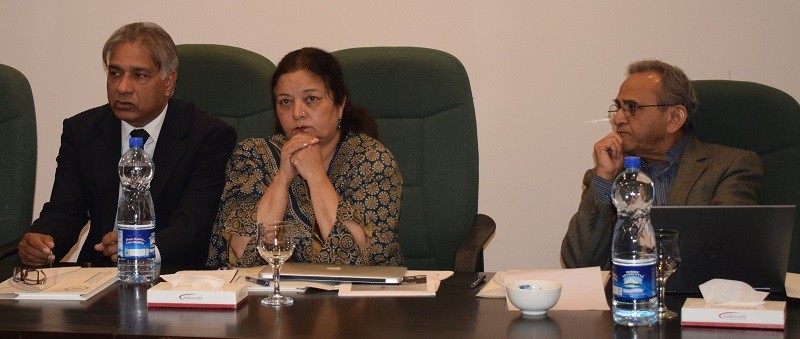LAHORE, Pakistan: The Working Group for Inclusive Education (WGIE) coordinated by the Centre for Social Justice (CSJ) held a virtual meeting with eminent experts in education on Wednesday.
The eminent experts included Dr. A H Nayyar, Dr. Baela Raza Jamil, Zubeida Mustafa, Dr. Khalid Masud, Dr. Yaqoob Bangash, Dr. Riaz Sheikh, Ms. Aanya Niaz, Ms. Camilla Chaudhary, Professor Anjum James Paul, Amjad Nazeer, and the Executive Director CSG Peter Jacob.
The Working Group discussed in detail, the Concept Paper prepared by the Ministry of Federal Education and Professional Training for the National Curriculum Council, the medium of instruction in order to introduce the Single National Curriculum.
The members appreciated the work by the National Curriculum Council and their efforts to consult with a wide range of stakeholders, from the private sector, the federation and the provinces.
The Working Group for Inclusive Education made the following observations on the Concept Paper:
- The WGIE appreciates that the provinces would be free to adopt their regional language as the medium of instruction in early education. It will encourage all provinces to utilise this provision to the fullest as numerous studies have conclusively shown that skills and education are best imparted through mother tongue as medium of instruction in early education.
- The WGIE acknowledges that a holistic view is now undertaken towards introducing English gradually as a medium of instruction from primary to the secondary level. It removes the discrimination on the basis of medium of instruction among schools in Pakistan, which has been increasing a linguistic inequity in recent decades.
- Together with the introduction of English as the medium of instruction, the WGIE strongly recommends that adequate and rigorous training be imparted to over 700,000 primary school teachers who will be the key implementers. Without long-term and continuous training, this change will only encourage rote learning, substandard acquisition of language and poor literacy.
- The WGIE emphasises that language acquisition with understanding, should be the main focus in the initial few years of education. Once adequate language skills are acquired, students can learn other subjects easily. The group thus concludes that if the first 3-4 years of primary education is spent exclusively on literacy (languages) and numeracy skills, the problem of choice of medium of instruction would become more amenable to resolve.
- The WGIE underscores that schools must be transformed into ‘creative spaces for foundational learning’ moreover the continuous experimentation should be backed by research on learning processes, especially in terms of the medium of instruction so that a holistic approach can be identified for optimum student learning.
- Rigorous and yearly evaluation of both the textbooks and methods of instruction must be undertaken so that lessons are learnt, processes improved, and decisions implemented. For this purpose, a group of experts be assigned a full-time task to monitor the results of such experimentation and innovations rendering evidence on the best way ahead.
